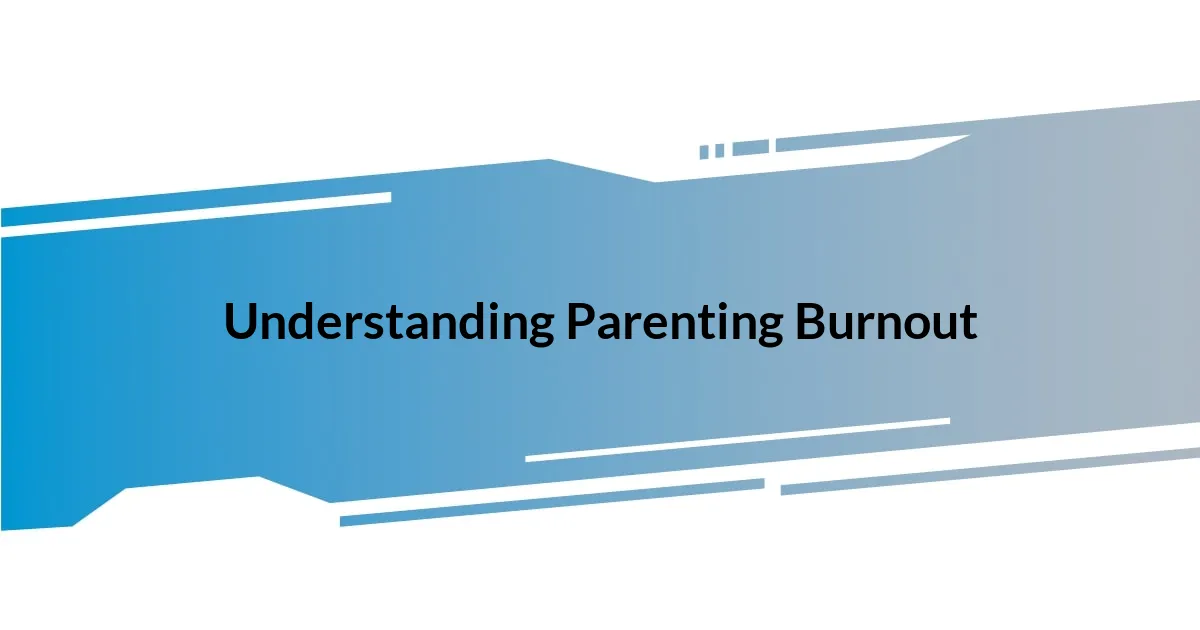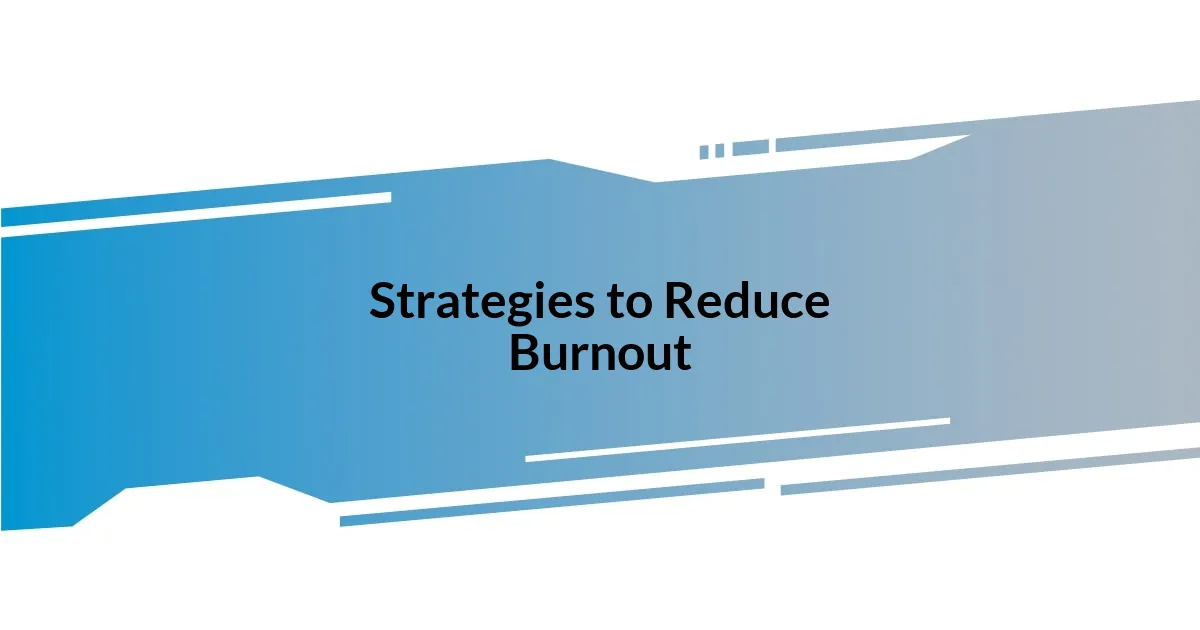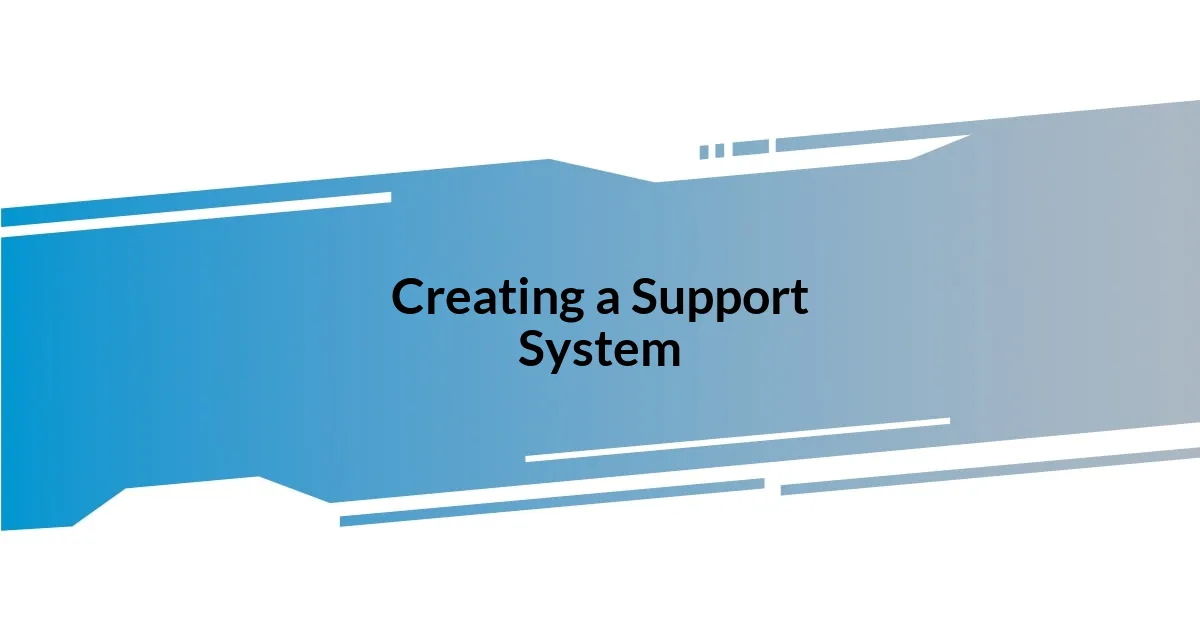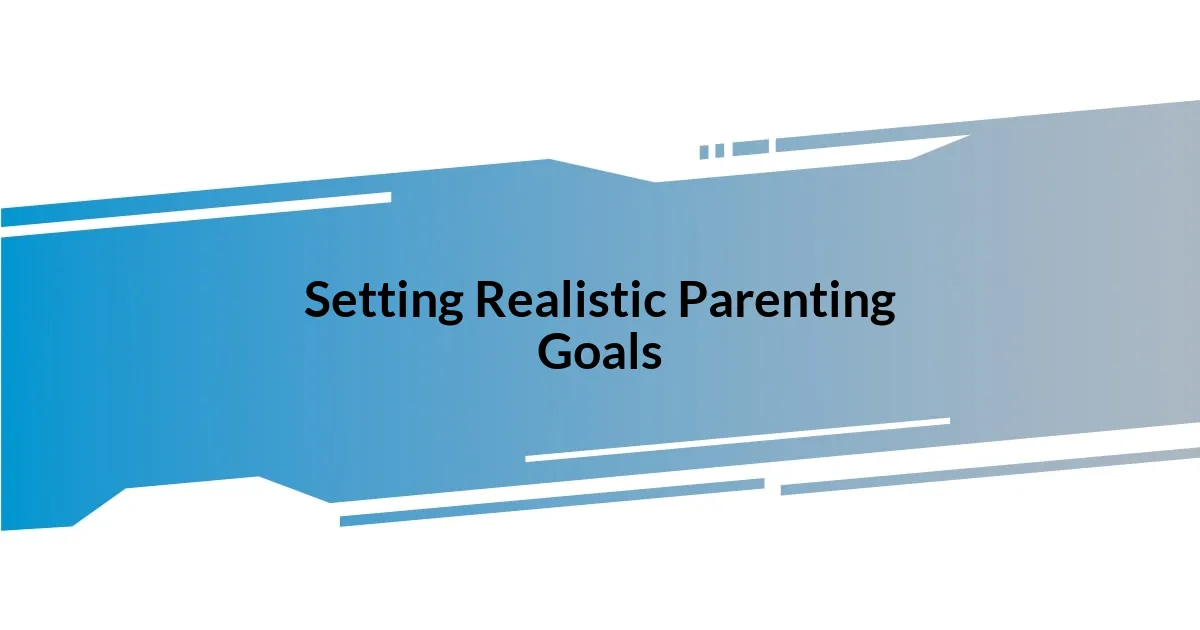Key takeaways:
- Parenting burnout involves emotional and physical exhaustion, often leading to irritability and disconnection from family interactions.
- Recognizing symptoms of burnout is crucial for ensuring mental well-being and restoring balance in parenting practices.
- Implementing self-care strategies, setting realistic goals, and building a support network can significantly alleviate feelings of burnout.
- Seeking professional help and joining support groups can provide essential emotional support and a sense of community for overwhelmed parents.

Understanding Parenting Burnout
Parenting burnout is a real phenomenon that many of us face but often overlook. I remember a time when I felt completely drained after juggling school activities, work, and household responsibilities. It made me wonder, “Am I the only one feeling this way?” The truth is, many parents experience overwhelming stress, leading to feelings of exhaustion and inadequacy.
What struck me about parenting burnout was not just the fatigue but the emotional toll it took on my well-being. I found myself snapping at my kids over small things, and that anger often replaced the joy I used to feel in spending time with them. It’s a stark reminder that if we’re not careful, our mental health can slip through our fingers, turning what should be cherished moments into sources of anxiety.
I often ask myself, what are the signs that I’m approaching burnout? For me, it began with irritability and a lack of interest in activities I once loved, like reading or even cooking. Understanding these signs was crucial; it helped me recognize when I needed to pause and reflect, rather than pushing through. This journey of self-awareness can be vital for restoring balance in our parenting lives.

Recognizing Symptoms of Burnout
Recognizing the symptoms of parenting burnout can sometimes feel like piecing together a puzzle. For me, one of the earliest indicators was a persistent sense of overwhelm. It’s as if daily tasks transformed into monumental challenges, and my patience wore thin. I recall a time when simply preparing dinner became a Herculean task, leading to frustration instead of satisfaction.
Another symptom that became strikingly clear was my emotional detachment. I found myself zoning out during family conversations or scrolling through my phone instead of engaging with my kids. It was a disheartening realization; I felt like a spectator in my own life. Recognizing this detachment was a pivotal moment. It forced me to confront the underlying fatigue that was sapping my joy and connection to my family.
Lastly, I began to notice physical signs creeping in, like headaches and fatigue that lingered even after a good night’s sleep. I remember a weekend when I had planned a fun outing, only to feel utterly exhausted and unable to enjoy it. These feelings often serve as wake-up calls, urging us to take a step back and reevaluate our self-care and mental health. It’s important to listen to these signals rather than dismiss them.
| Symptom | Description |
|---|---|
| Emotional Detachment | Feeling disconnected from family interactions and losing interest in activities. |
| Increased Irritability | Snapping at loved ones or feeling overwhelmed by daily tasks. |
| Physical Fatigue | Constant tiredness, even after rest, alongside headaches or tension. |

Strategies to Reduce Burnout
Finding effective strategies to manage parenting burnout can drastically change how we experience daily challenges. I’ve discovered that setting aside time for myself, even if it’s just a long shower or quiet moment with a cup of tea, does wonders for my mental state. It might sound simple, but these little rituals can recharge my batteries, allowing me to show up fully for my kids.
Here are some practical strategies that have helped me reduce burnout:
- Create a Support Network: Connect with other parents for shared experiences or help with childcare.
- Set Realistic Expectations: Acknowledge that it’s okay not to have everything perfect; prioritize what truly matters.
- Practice Mindfulness: Incorporate short meditation sessions or deep breathing exercises to stay grounded.
- Establish Boundaries: Learn to say “no” to activities that overwhelm you and safeguard your family time.
- Delegate Responsibilities: Share chores or tasks with family members to lighten your load.
Embracing these strategies has made my parenting journey far less daunting. I’ve learned that prioritizing my well-being isn’t selfish—it’s necessary for my family’s health.

Creating a Support System
Building a solid support system can be a game changer when it comes to managing parenting burnout. In my experience, reaching out to other parents was like discovering a lifeline. I vividly remember when I connected with a close friend from my kids’ school; we began trading playdates. Suddenly, I had a few hours each week where I could breathe, unwind, and even tackle some overdue tasks while my kids played together. It was a small adjustment, but it made a significant difference in how I coped with the demands of parenting.
Let’s face it—parenting can be isolating, and sometimes it feels like you’re in it alone. I often wondered why I felt so drained when everyone else seemed to be doing just fine. But those moments of vulnerability are also when I found the courage to share my feelings with my family and friends. Opening up about my challenges not only lightened my emotional load but also allowed others to support me. It’s amazing how many parents feel the same way; sharing these experiences can foster a strong sense of community.
On a practical note, I also recommend leveraging technology to enhance your support network. I created a group chat with my friends where we swap parenting tips and vent about our daily struggles. It’s comforting to know there’s a group of people who genuinely understand what I’m going through at any hour of the day. Whether you’re sharing a funny parenting fail or seeking advice on handling a tantrum, having that virtual support can help transform those tough moments into something more manageable. How has your own support network helped you through challenging times in your parenting journey?

Setting Realistic Parenting Goals
Setting realistic parenting goals is crucial for maintaining our well-being. For a while, I remember feeling overwhelmed by the pressures to be the perfect parent—homemade lunches, endless craft projects, and structured playdates filled my mind. I quickly learned that focusing on a few achievable goals each week, like having family pizza night or reading a bedtime story, not only made me feel accomplished but also strengthened our connection.
Another key aspect is to be flexible with those goals. I once aimed to keep a strict schedule for my kids, only to realize it was causing more stress than joy. When I allowed myself to adapt our routines to fit our moods—maybe an impromptu trip to the park instead of a scripted day—I discovered that balance isn’t about perfection; it’s about presence. Have you ever found that letting go of rigid expectations opens up more opportunities for joy in your parenting? It certainly changed my perspective.
Lastly, it’s essential to celebrate small wins along the way. I started jotting down little achievements, like a fuss-free grocery trip or an extra 10 minutes of play without interruptions. These moments that seem trivial can really boost our morale as parents. When was the last time you paused to appreciate your efforts? Recognizing our progress—no matter how small—can be a powerful motivator in our parenting journey. Setting goals doesn’t have to be about aiming for an ideal; rather, it’s about finding what works for our unique family dynamic.

Practicing Self-Care Techniques
Practicing self-care has been a transformative journey for me, particularly amid the chaos of parenting. One technique that has resonated deeply is carving out time for mindfulness, even if it’s just 10 minutes a day. I remember sitting on my porch with a warm cup of tea, focusing on my breath, and feeling the tension melt away. This simple act brought a sense of calm and clarity that made a world of difference in how I approached the day’s challenges.
Another essential self-care method is engaging in activities that reignite your passion. For a long time, I put my love for painting on the back burner, believing that parenting left no room for personal interests. However, when I took the plunge to participate in an online art class, I felt invigorated, as if I was reconnecting with a piece of myself that I had lost. Have you ever tried revisiting a hobby you once loved? That experience reminded me that nurturing my interests not only replenishes my spirit but also makes me a better parent when I’m filled with joy.
Lastly, I can’t emphasize enough the importance of physical activity in self-care. Whether it’s going for a brisk walk or doing a quick home workout, moving my body brings an instant mood boost. I recall a particularly hectic day when I was overwhelmed by deadlines and my kids’ demands. A mere 20-minute dance session in my living room lifted my spirits and transformed my day. How often do we overlook the simple power of movement? I realized that prioritizing these moments can rejuvenate our mental health, creating a ripple effect that benefits everyone in the family.

Seeking Professional Help Options
Seeking professional help can be a vital step when parenting burnout feels overwhelming. I remember a time when I hesitated to reach out to a therapist, worried I’d be judged for not being able to ‘handle’ it all. However, once I took that step, it felt freeing to discuss my challenges with someone who understood. Have you ever experienced a moment of relief simply by sharing your struggles?
There are various resources available, from traditional therapy to group sessions, which can offer support and camaraderie. Joining a local parenting support group was a game-changer for me. Sharing laughs and tears with others in similar situations reminded me that I wasn’t alone. Have you thought about how talking with peers can lighten the emotional load? It turned out that simply acknowledging each other’s experiences cultivated a sense of community that I desperately needed.
Exploring online therapy options also opened new doors for me. I vividly recall my first video session with a counselor; despite being at home in my pajamas, I found the experience surprisingly intimate. These flexible formats made it easier for me to prioritize my mental health without adding the stress of commuting. If you’re considering seeking help, have you looked into what formats work best for you? After trying it, I realized that investing in my mental well-being wasn’t just okay—it was essential.